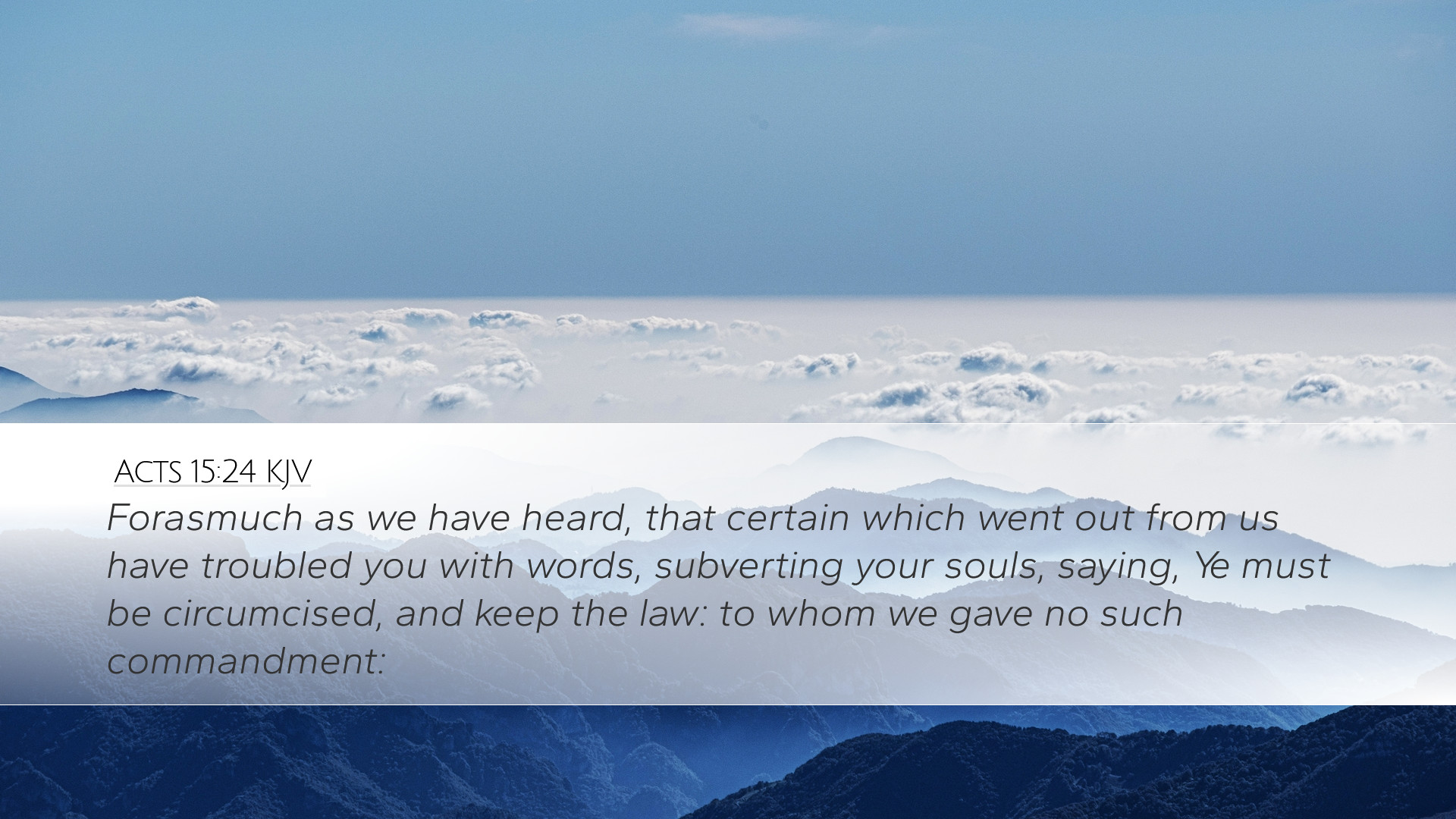Commentary on Acts 15:24
Text of Acts 15:24 (KJV): "Forasmuch as we have heard, that certain which went out from us have troubled you with words, subverting your souls, saying, Ye must be circumcised and keep the law: to whom we gave no such commandment."
Introduction
Acts 15:24 is a pivotal verse within the context of the early church, particularly as it pertains to the debate surrounding the necessity of adhering to Jewish law and customs. This verse encapsulates the summation of the Jerusalem Council's decision regarding the relationship between grace and the law, offering significant insights into the theological discourse of the time.
Historical Context
Throughout the early days of Christianity, the question of whether gentile converts should adhere to Jewish practices, especially circumcision, generated considerable debate. The Jerusalem Council, as described in Acts 15, sought to address these urgent issues and bring clarity to the church.
Many early Christians were troubled by false teachings which insisted that salvation required adherence to Jewish law, including circumcision. The apostles, particularly Paul and Barnabas, defended a doctrine of salvation through faith alone, emphasizing that the grace of Jesus Christ was sufficient for all believers.
Insights from Matthew Henry
Matthew Henry, in his extensive biblical commentary, underscores the confusion that arose from those who claimed to be representatives of the apostles yet taught contrary doctrine. He writes that these individuals "troubled" the church, which implies a deeply unsettling influence over the faith and practice of the believers.
Henry emphasizes that the apostles were self-aware of their authority and mission, clarifying that they had not sanctioned such teachings. The intention behind their letter, referencing Acts 15:24, was to set the record straight, assuring the church that the beliefs being propagated were not endorsed by the apostles. Henry affirms that the message of grace should bring comfort, and that believers' souls should not be disturbed by false requirements.
Reflections by Albert Barnes
Albert Barnes further elaborates on the significance of the phrase "have troubled you with words." Barnes draws attention to the detrimental effects of erroneous teachings, particularly how they lead to spiritual confusion and anxiety among believers. He comments on the phrase "subverting your souls," suggesting that false teachings can lead individuals away from the core tenets of faith, creating an unstable spiritual foundation.
Barnes highlights the importance of the Church in providing sound doctrine, emphasizing the authority vested in the apostles. The decision made at the Jerusalem Council and conveyed through this verse serves as a vital reminder that salvation is offered through the grace of Christ, independent of the law. Such truths remain essential for pastors and leaders as they guide their congregations in understanding the gospel's liberating message.
Insights from Adam Clarke
Adam Clarke's commentary adds depth to our understanding of Acts 15:24 by analyzing the Greek terms used in the original text. He notes the careful language employed by the council, indicating measures that were taken to maintain a clear, united message among believers. Clarke also points out that the council not only rejected the necessity of circumcision but sought to affirm the collective faith of both Jewish and Gentile believers.
Clarke encourages readers to appreciate the transitions within the early church. He illustrates that while the Old Covenant centered upon adherence to the law, the New Covenant introduced a personal relationship with Christ based on faith and grace. This distinction was critical for early believers grappling with their identity in light of Mosaic traditions.
Theological Implications
This verse serves as a theological touchstone for understanding the relationship between faith and works. The groundwork laid by the Jerusalem Council is pivotal for the development of early Christian doctrine. Here, the church decisively affirms that salvation is not attainable through human efforts but through divine grace alone.
- Grace Over Law: Acts 15:24 marks a historic affirmation that the grace of God supersedes the demands of the law. This principle is foundational for the New Testament theology.
- Unity in Diversity: The decision reached at the council demonstrates a commitment to unity despite cultural and doctrinal differences. This unity is essential for today's church, which faces its own divisions.
- Authority of the Apostles: The verse stresses the importance of apostolic authority in guiding the church. Pastors and theological leaders must acknowledge and respect the historical context and authority of Scriptures in their teachings.
Conclusion
Acts 15:24 provides rich material for pastors, theologians, and students of the Bible to explore issues of grace, law, and spiritual authority. The verse not only chronicles a significant moment in the history of the early church but also carries forward timeless truths that shape our understanding of faith and fellowship today. By reflecting on the insights from Matthew Henry, Albert Barnes, and Adam Clarke, we gain a deeper appreciation for the complexities of early Christian doctrine and its relevance for contemporary Christianity.


